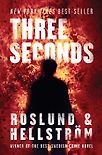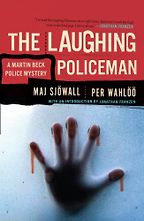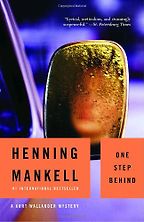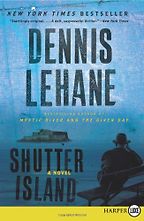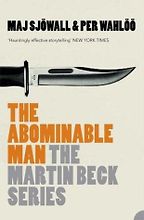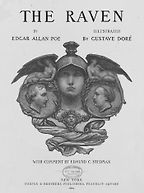Anders, when did you personally realise that Swedish crime fiction was becoming so popular outside Sweden?
Although we were popular in the rest of Europe, the problem we used to have is that Swedish crime fiction was fighting for its share of the 5% of books in the UK that are translated. That includes every language and Swedish is just a small language, so initially it was hard for us to break into the market.
But in 2003 at the London Book Fair our Swedish agent called us and said, “Guys, they are going to translate you into English!” For us it was a big surprise because English was considered such a hard language to get translated into. Of course Stieg Larsson’s success had a lot to do with it. But in Sweden he actually started publishing his books after us. We already had a big readership and had won the Nordic Prize and then we started to get known elsewhere but it was Larsson who opened the door for Swedish crime novels to be translated.
How would you describe Swedish crime fiction as a genre?
I think, and I am quite convinced that I am correct, that the Swedish genre is connected through language and coming out of the same tradition, but at the same time there is a wide variety of styles within that genre. Many people are inspired by the whodunits. And then we have thrillers and books like ours that include the former tradition and the new one. And I think that is why the genre has boomed here. That kind of writing somehow got new energy through to the whole genre. So we share a language and we share a tradition but there is a lot of diversity as well.
What is the tradition?
It was started by the two authors Maj Sjöwall and Per Wahlöö. They were a couple who were writing in the seventies and I grew up reading their books. They showed everyone how you could combine entertainment, excitement and a thrilling story with some sort of conflict – if you want it. They also included discussions on the state of society and they were very politically aware. They were writing between 1965-1970, when everyone was talking about politics.
Maj Sjöwall and Per Wahlöö are actually the authors of a very popular series of books called the Martin Beck mystery series, which you have chosen as your first choice.
They were very popular in the seventies and I see them as being the founders of Swedish crime novels. They wrote their first book in 1965 and then they wrote one book a year between 1965 and 1975. They saw every book as being like a chapter in a big book. And the 10 books are considered as a whole book. They showed it was possible to write in this way and made this kind of writing acceptable with the Swedish publishers. But it was another 15 to 20 years before my generation, who had grown up with them, started to use these tools. That is where the tradition comes from. Maj Sjöwall is still alive and she is a dear friend to me and Börge.
I know you have read and enjoyed all the 10 books but can you tell me a bit about their fourth novel, The Laughing Policeman?
This book was made into a Hollywood film and it got the Best Novel Edgar Award from the Mystery Writers of America. The hero of the story is Martin Beck, a Swedish police detective. But you also get the story from the point of view of many different policemen who are all contributing to solving the story. And that is one of the things we have inherited from Maj Sjöwall and Per Wahlöö that we use in our books – we try to write from different people’s perspectives.
How did they go about writing the books together and is that similar to the way that you and Börge work?
They had a very different way of working from me and Börge. According to them they wrote a chapter each and they imitated each other’s styles. I know for a fact that that is very very hard – at least for us. In the end it must be one pen delivering the final version. The reader can tell if someone is trying to imitate someone else’s style and feels uncomfortable with that. So if they really did manage to write like that they are even more fantastic than I thought! To me it feels like one person was writing the story and it doesn’t matter who is writing it.
I re-read The Laughing Policeman a few years ago because I was writing the foreword for it and what struck me is that despite some of their descriptions obviously coming from the 1970s the plot is timeless. So even though in the book they talk about the price of electricity very much in terms of back then and people are lying about in bed smoking all the time, the story isn’t old. The plot still works. Forty years later the story is still gripping. The way they switch between the different policemen contributing to the investigation is really good.
What about you and Börge – how do you go about writing your books together?
Börge and I are very happy to talk about anything apart from the actual process of how we write our books together. We gave a promise never to talk about the actual process of writing the books. I like to keep some mystery around that. But I can tell you about the lead up to writing our books. We have worked together for 15 years and when we are thinking of writing a book we divide it into three periods.
Our latest book took us three years. We had a year of research to get the unique people we needed for the story. Then there was one year of sitting face to face plotting about 120 pages. So we know exactly what is going to happen in chapter 18 and chapter four before the writing process even starts. And then the actual writing takes eight months to a year. We had to invent this style because there are two of us and we had to agree on everything before the writing process, when we turn those 120 pages into 500 pages.
But we have seen that it works. Our books have been turned into movies both in Hollywood and here in Sweden and when the script writers get in touch with us they often comment on how they haven’t been able to find anything which is illogical and doesn’t work within the story.
That must be because of all the preparation you do before writing.
Yes.
Next up you’ve gone for someone who is very well known on the international scene, Henning Mankell and his book One Step Behind, which is one of the Kurt Wallander mysteries. For those who haven’t come across him, can you describe Kurt Wallander as a character?
Kurt Wallander is the nineties version of Martin Beck, the hero from the last book I was talking about. He is a police detective who thinks a lot and likes to be on his own. But unlike the Martin Beck books, Henning Mankell uses Wallander as the main voice throughout the book.
In 1991 I was working at the biggest news station in Sweden, which is a bit like the BBC because it is a public service one as well. My editor came to me and said, “Anders, there is some sort of new prize about crime – it is the Nordic Prize. I am not sure what it is about. There is this new guy called Henning Mankell. Can you do a story on him?” So that was the first time Henning Mankell was on television. And then when we got the Nordic Prize in 2004 I was so happy. But Mankell was the one who took the Swedish tradition from Martin Beck and turned it into Wallander.
Support Five Books
Five Books interviews are expensive to produce. If you're enjoying this interview, please support us by donating a small amount.
One thing he did was place him in a small town called Ystad in the south of Sweden. That is different from the Martin Beck books and our books, which are based in Stockholm. We think that if you base a story in Stockholm it is more realistic in that a lot of crime is going on there already. He chose to set his books in a peaceful town. But that is his thing and it works. Even though I don’t know how realistic it is to set the stories there, I still really enjoy them. They are well written. He is so productive. He writes a whole range of other books as well and also writes plays.
Before I move on to Börge’s choices, let’s finish with your final book, which although not a Swedish crime novel is something which has inspired your writing – Shutter Island by Dennis Lehane.
This is the best non-Swedish crime book I have ever read. It has the same ingredients as his other more serial-like books – the surprising end and the language. He was in Stockholm not long ago and I missed that and I am still angry I wasn’t there. He is someone I really admire because he writes the almost complete crime.
What do you mean by that?
It has characters I believe in, there is good writing and it has an ending which I didn’t see coming. So for me that was perfect. He takes me by the hand and he leads me through the story as a storyteller should.
Is he someone you try to emulate or do you just appreciate his talent?
I just appreciate him. Whenever you write yourself you have to be yourself and believe that you are good enough as yourself. You can’t try to take on someone else’s style. But of course other good writers can always inspire you to do better and Lehane is one of them.
I am interested that none of your three choices were by Stieg Larsson – why not?
I was picking books which have inspired me, and Stieg was inspired by us! I am not trying to sound difficult. But you have to understand that in Sweden we had such a big audience before he even started to publish. If anyone was inspiring anyone it was Stieg at that stage being inspired by me and Börge because we had already published our books. In the UK and US he was successful before us, so I realise that for people in countries like the UK and the US it seems as if he was the first one.
I knew him as a journalist and he helped me when I was investigating a story on a right-wing extreme party. I had to have a bodyguard for my own protection and he helped me to deal with that because he was living under the same circumstances. So I really appreciate him because of that.
Why do you think he became so popular outside Sweden so fast?
In my opinion he invented a character in Lisbeth Salander that was the perfect character for his story. The books are somewhat longer in Sweden. I guess we get more of the Swedish politics than when they are published for a wider audience. The English publisher has, of course, changed parts.
Thanks Anders. Now it’s time to talk to Börge. Let’s start with The Abominable Man by Maj Sjöwall and Per Wahlöö. The book is set in your childhood neighbourhood. Do you think they do a good job of describing the area?
Yes, they did a very good job. I grew up in that area and everything is very well described. They are writing about a part of Stockholm and there is a helicopter crash in a local square in the story. A policeman gets killed and just beside that square is a place I used to go as a child when I went to the dentist, so I remember it well. Also, at the end of the story the murderer is up on the roof of the building that he was operating from. And that house actually belongs to a friend of mine from school.
What happens in the story?
It starts with a murder in the local hospital. A senior policeman is killed. Martin Beck is investigating the murder and he realises that the policeman who got killed wasn’t a good policeman. Everyone hated him. The story shows how the murderer is in some way connected to the bad policeman. The policeman made one bad choice which links him to the murderer and that is why the killer started killing policemen. The authors are great at doing the dialogue. It is so realistic. They were a little bit radical in their politics and there are lots of discussions to do with that. They describe Swedish society in the late sixties and early seventies.
Finally, you have chosen a poem which you came across as a child – The Raven by Edgar Allan Poe.
This is very special. I first came across it when I was nine years old. I still remember this cartoon which had the raven in it. It really affected me because the raven was so sinister and nasty. It really scared me. It was so close to things to do with death and the supernatural. What I was looking at was a cartoon version of Poe’s The Raven. I was so taken by the story I asked my mother to track down the original for me.
Do you think that is what made you interested in getting to know more about the darker side of life?
Yes, definitely.
Years later you became a crime writer. And for the last few days you have been caught up in a whirlwind of press activity and it has been very hard to pin you both down for an interview. It is all because you have recently published a new book, Two Soldiers. What is it about?
Every big city has gangs in the suburbs. This is a book about those gangs, made up of young people. We are exploring how they think and act. They are extremely violent, these gangs. They are involved in a lot of crime.
Is this something which is becoming more of an issue in Sweden?
I have seen this problem growing over the last 20 years and exploding in the last six months. So now it is on the map. Everybody knows about it. Not that long ago a female prison guard was murdered in prison by one of these gangs. We describe something similar in our book. We wrote about it before this had actually happened.
You recently did a talk with Anders in a high-security prison. What kinds of things do you talk to the prisoners about?
We go to the prison as part of a support group for the people who are trying to make the prison more of a cultural place. So the prisoners get to work with different cultural groups. We started talking about our books to the prisoners and the guards. But then when we finish everyone comes to us and we talk about lots of different things. It was very interesting because some of these prisoners were gang members so we can find out from them what is going on.
You are someone who is well known in Sweden for fighting hard to prevent crime but you are also an ex-convict. What made you change your ways?
I have been in prison twice in my life. I was very young. I was using drugs. Today I am a recovering alcoholic. I have been sober for 19 years now. As a young kid I used to fight a lot and got mixed up in crime.
But now I have completely changed. I no longer have a criminal record and I have realised that by preventing crime you can also help both criminals and victims. I help the criminals not to create more victims. Every time a person does a crime, they create a victim. As long as you are not a psychopath, the chances are you will have feelings towards your victim. I know I did and other people do. So to prevent crime you have to try to stop people from suffering, be that the criminal or the victim.
May 22, 2012
Five Books aims to keep its book recommendations and interviews up to date. If you are the interviewee and would like to update your choice of books (or even just what you say about them) please email us at [email protected]

Anders Roslund and Börge Hellström
Anders Roslund and Börge Hellström made up the Swedish crime-writing duo known as Roslund & Hellström.

Anders Roslund and Börge Hellström
Anders Roslund and Börge Hellström made up the Swedish crime-writing duo known as Roslund & Hellström.

